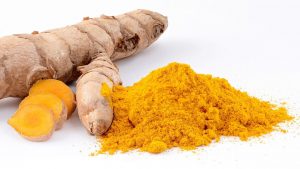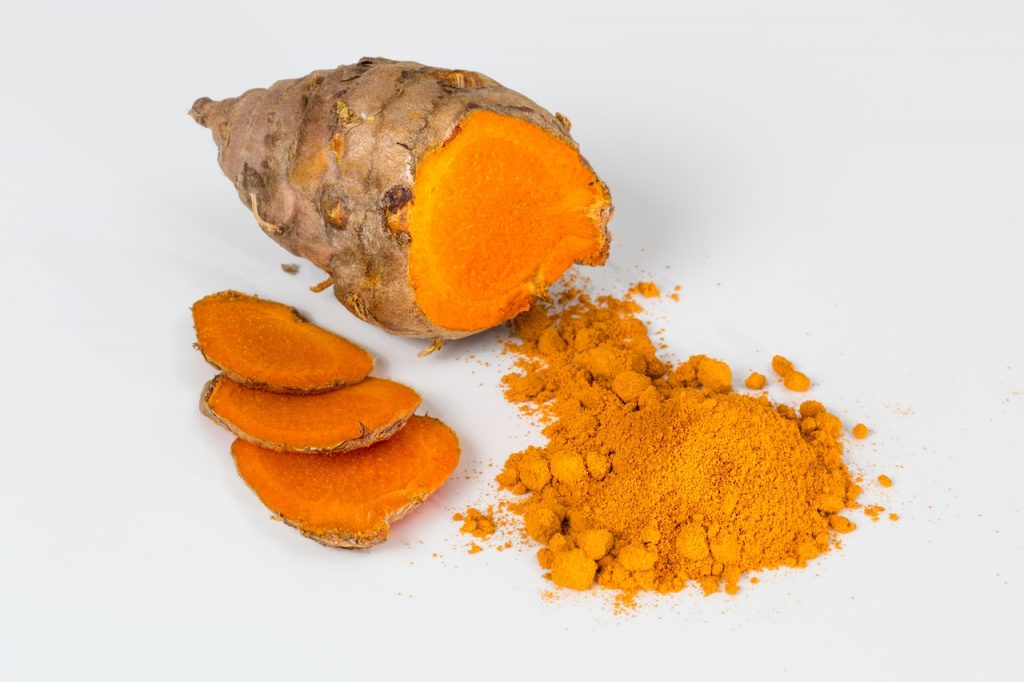Time-revered herb turmeric may protect against liver disorders, but more clinical research is needed.

Turmeric (curcumin) is an Asian herb used to treat a wide range of health conditions – including liver disorders – for thousands of years. Turmeric has been suggested to support liver health through:
- Antioxidant activity. Turmeric protects the liver from oxidative stress by neutralizing free radicals and increasing the body’s own antioxidants.
- Reducing inflammation. Turmeric seems to inhibit NF-κB, a major inflammatory pathway involved in liver disorders.
- Protecting against fibrosis. Turmeric may suppress TGF-β1, a cytokine with a central role in liver fibrosis.
Overview
Turmeric (Curcuma longa) is one of the most popular medicinal herbs in the world. Turmeric root has potent antioxidant and anti-inflammatory effects, and has been utilized for thousands of years, particularly by India’s Ayurvedic medicine.
Today, turmeric and its main active ingredient curcumin is one of the most widely-researched herbal remedies, and has been investigated as a therapeutic option for a wide range of conditions. Indeed, turmeric supplements are used to help with cardiovascular health, diabetes, arthritis, autoimmune disorders, Alzheimer’s, digestive conditions, liver disorders, and more.
Research on turmeric’s liver-protective effects is promising, with early evidence of protection against all major liver conditions. However, we do not know if these benefits extend to humans due to lack of clinical studies.

How Turmeric Might Help With Liver Health
Turmeric (curcumin) has been suggested to protect and support liver health through multiple mechanisms:
Antioxidant activity
Oxidative stress plays a central role in liver disorders and injury.1 As a potent antioxidant, curcumin helps counter this oxidative stress and maintain healthy levels of the antioxidant glutathione in the liver. 2
Anti-inflammatory activity
NF-κB is one of the body’s major inflammatory pathways, and its increased activation is involved in liver disease and liver damage. Curcumin’s potent anti-inflammatory effects inhibit this pathway, reducing the release of proinflammatory cytokines that ultimately lead to liver inflammation and damage. 3
Inhibition of TGF-β1
TGF-β1 is a cytokine believed to play a central role in the development of liver scarring (fibrosis) – the condition characterizing virtually all chronic liver disorders, and ultimately leading to cirrhosis. Curcumin appears to suppress the TGF-β1 pathway, reducing both liver inflammation and fibrosis. 4
Turmeric Uses & Benefits for Liver Health
Turmeric is a popular herbal remedy for common liver conditions, including fatty liver, hepatitis, and cirrhosis.
Animal and cell culture research supports turmeric’s liver-protective effects. As one recent review paper of this research summarized, “curcumin shows therapeutic actions in different liver diseases, namely, hepatitis B, hepatitis C, alcoholic liver disease, nonalcoholic fatty liver disease, drug‐induced hepatotoxicity…biliary cirrhosis, and primary sclerosing cholangitis.” 5
However, there are currently little to no human studies looking at the effects of turmeric and curcumin on liver function. As such, it’s impossible to say whether its liver-protective benefits translate to humans.
Research
Animal & Petri Dish Research
Animal and isolated cell culture studies of curcumin’s effects on liver disorders report promising findings, including:
- Inhibition of hepatitis B & C viruses by interfering with their entry into cells and replication 6 7 8
- Protection against alcoholic liver disease & cirrhosis 9 10
- Reduction in the development and progression of liver fibrosis and damage in mice & rats 11 12
Human Research
There are few studies looking at the effects of turmeric and curcumin on liver function. However, existing evidence is supportive of turmeric’s liver-protective effects, as highlighted by a reduction in the levels of enzymes linked to liver conditions.
This randomized, double-blind, placebo-controlled study evaluated the effects of fermented turmeric powder (FTP) on liver function. A total of 60 people elevated levels of alanine transaminase (ALT) – an enzyme used as an indicator of liver health – were given FTP (3 g) or placebo daily for 12 weeks. Only the FTP group experienced a significant reduction in levels of ALT and another enzyme marker called AST, suggesting improved liver function and potential protection against liver disorders.
- The researchers concluded that “The results of our study show that the ingestion of 3.0 g FTP significantly reduced serum ALT and AST levels without severe AEs, indicating that turmeric may help improve hepatic disorders.” 13
Curcumin (400 mg) seems to improve a marker of liver health
This placebo-controlled study looked at the benefits of Longvida brand curcumin. Thirty-eight adults were given Longvida curcumin (400 mg) or placebo daily for 4 weeks and had their blood and saliva examined. The supplementation improved several health measures, including a reduction in the levels of ALT, an enzyme that is elevated in liver inflammation or injury.
- The researchers concluded that “…a low dose of a curcumin-lipid preparation can produce a variety of potentially health promoting effects in healthy middle aged people.” 14
Dosage for Liver Health
- There is too little research to suggest a research-backed curcumin dosage for liver health
- Turmeric supplements come in 500 – 600 mg turmeric root powder capsules standardized to 95% curcuminoids, taken 1-3 times daily
Available Forms
- Whole turmeric root. Turmeric is widely available in its raw form.
- Turmeric root powder. This form can be presented in capsules, tablets, and complexes.
- Turmeric extract. This form contains a guaranteed level of curcuminoids (typically 95%), the main active ingredient in turmeric.
- Meriva®. This branded form uses patented technology to combine curcumin extract with phosphatidylcholine, which is advertised to increase absorption by 29 times.
- Longvida®. This patented form uses innovative lipid matrix technology to protect curcumin in the stomach and greatly enhance its absorption. Longvida is touted to have 65x the absorption of generic curcumin.
- Curcumin C3 Complex®. This patented form supplies 95% curcuminoids, and is notable for being used in more human studies than any other curcumin ingredient.
- BCM-95®. This patented extract combines 86% curcuminoids with 7-9% turmeric oils to enhance absorption.
Supplements in Review Recommendation
- Turmeric 500 mg 1-3 times daily for liver health.
Turmeric is worth trying for liver issues. Preclinical research suggests curcumin has liver-protective properties that could help with a variety of conditions. However, the lack of human studies make turmeric difficult to recommend outright.
It’s best to follow supplement dosage recommendations. Because of the lack of human research, it is best to use dosages used by supplements, which are usually in the 500-1500 mg range.
Further Reading: MSM and Turmeric: Can You Combine Them?
Leave a Reply